Elegant Vintage in East Lakeview: 511 W. Aldine
511 W. Aldine is one of those elegant courtyard buildings that dot the streets of East Lakeview.
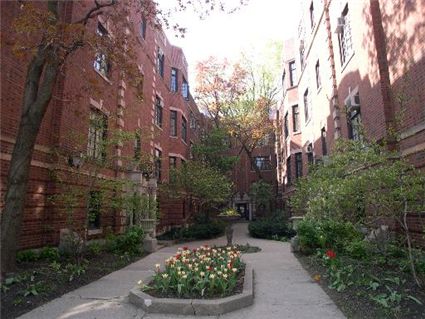
Built in 1926, this building does not disappoint with large units and original vintage features. The listing says it “light-filled European vintage”.
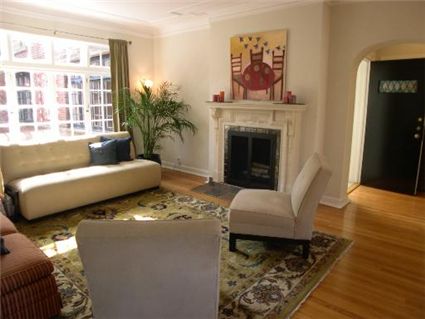
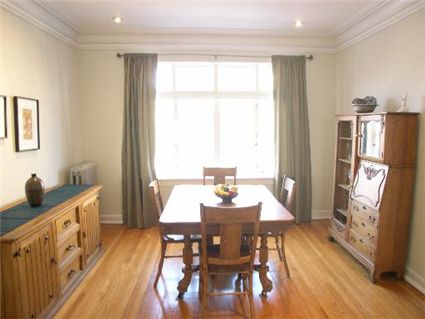
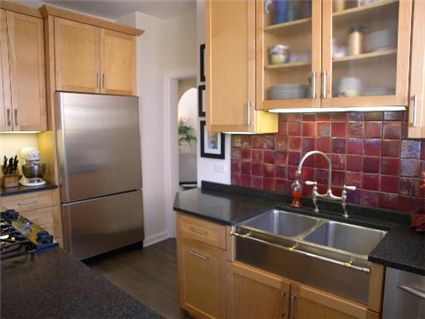
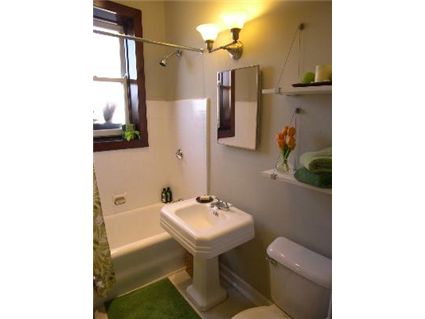
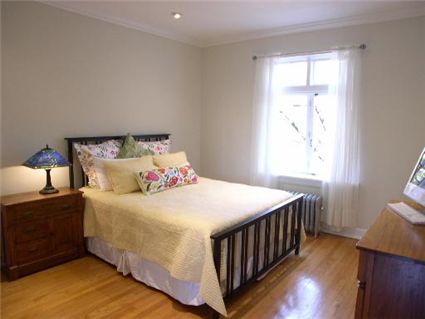
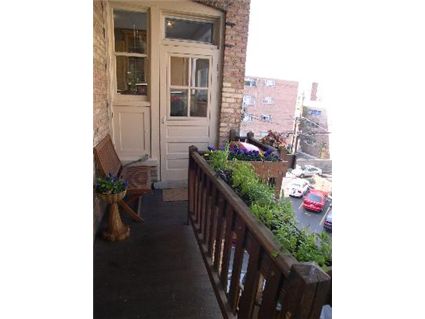
Unit #3F: 1 bedroom, 1 bath, diningroom, woodburning fireplace
- I couldn’t find a prior sales price
- Currently listed for $310,000 (parking space included)
- Deck
- Listing doesn’t say it has a w/d (the two bedroom listing in the building does however)
- A/C Window Units
- Assessments of $234 a month
- Brad Lippitz Real Estate Group has the listing
It’s gorgeous front to back, and I like the dark red tile backsplash in the kitchen with the dark counters and pale cabinets. Adds a touch of eccentric glam. Is it OK to say something about the decor as long as I say something nice? The colors are nice and the owner’s possessions have charm, and really make the place show well, even though it’s a beauty stark naked.
But I question $310,000 for a one bed anywhere outside of glossy downtown buildings, and, if current price trends are anything to reference, I question it even in brand-new downtown buildings.
$200K is more like it.
Laura:
I agree that $310k sounds like a lot for a one bedroom with dining room in Lakeview. I’ve seen many of the units in East Lakeview pricing around this price point though. We’ll see if any of them get it.
Well, Sabrina, let’s figure.
This place would rent, I would think, for about $1400 a month, which would include the heat, which is probably included in the condo assessment of $234. Most buildings like this one, have one boiler. Deduct the heat and insurance and taxes, and you’re down to about a thousand as what you could pay on your mortgage and still cover your bills.
Now, I wouldn’t expect this place to go for absolute rent-parity, but there still has to be a reasonable relationship between the purchase price and monthly debt and maintenance service; and the cost to rent. The usual number is 160X monthly rent- that means the RENT, not the heat bill and taxes, which are add ons when you buy. Figuring 200X the rent after these deductions are made, I figure $200K to $210.
I really do believe that $300K is the peak price for this, and that a prudent buyer would automatically deduct 30% from the peak price.
Laura:
I completely agree regarding rents versus what the asking prices are. There is a HUGE gap in every single neighborhood. That means either:
1. Rents will go up
OR
2. Prices will come down
I’m taking a guess that it will be prices coming down.
I just have to say I love the red tile backsplash also. It is nice to see something besides the usual grey or brown granite. Is this a top floor unit? (I prefer top floors in older buildings for noise reasons)
Laura:
For this one bed condo at 511 Aldene, I completely disagree that there should be rent parity for it. You can argue rent parities, neighborhood comparisions, prices per square foot, but one true measure has been along from the day Adam and Eve put up the first hut in the Garden of Eden – the unit is worth what someone is willing to pay for it (along with what banks will loan for the property). As long as there are emotional buyers with money and a job, and a bank willing to give a loan, people will overpay to be in certain areas. Lincoln Park/Lakeview is one of these areas, Manhattan Illinois is not. So although I do agree that the price is too high for my tastes, it will eventually sell. After all – “There is one born every minute” (to quote PT barnum). Just ask anyone who bought from any AMERICAN INVESment COmpany lately.
Morgan: Good to see you back. I take it you’re still renting then?
The listing for #3E (the 2 bedroom, 2 bath unit also currently for sale) says it’s a top floor unit- so I’m assuming the one bedroom on the third floor is as well.
McEXit’s words are true wisdom.
The limiting factor to LP/LV I see is that these suckers, as Mr. Barnum put it so succinctly, tend to be younger.
By the time they are in their mid-30s, many have kids or aren’t as intrigued with living in the best neighborhoods in Chicagoland (ok I’m biased as I live here, but I don’t think its a stretch).
So I think they will hold up the lower end of the market to a degree. Anybody with a 70k/year job can buy a jr-1bdrm for 200k. Many white collar workers in their mid-late 20s earn this. Many don’t know a thing about finance, economics or real estate but want to own a property. It IS a status symbol to many people.
When you start looking at 450k+ properties, I think its entirely different. These younger folk are priced out for the most part. At this price range economic fundamentals are going to take over as folks with money don’t tend to be the folks PT Barnum was talking about. Theres only so many trust fund folks & dual career couples that make 200k+/year to support the high end.
Getting over $300,000 for a one bedroom is hard in most city neighborhoods. In Lakeview, it is completely absurd, especially in a “vintage” (i.e. maintenance nightmare) building.
Regarding question if I am stil renting, I renewed my lease of a condo that is $2400 a month that the owner purchased for 575,000. Units are now selling about 150k less in my building than they were 12 months ago. There is a now a for sale by owner at 395,000 that is the lowest listing price I can ever remember in my building. Count me as a happy renter at this point, though I see myself starting to look to purchase seriously again this fall. The money I earned from the sale of my property in San Francisco earns enough to pay my rent so I don’t feel I am “throwing away my money on rent”.
If you were to go strictly rent parity for this, $160K would be more like it.
$200K allows for “emotion” and the fact that this is a better place than most Lakeview courtyard buildings.
$300K is a bubble price, for 60657, which has a median income of $59K. The median income for a homebuyer, of course, is higher, though I do not have that number. Figure you need an income of $80K to buy this unit if you put 20% down, for a mortgage of $240K, especially in this credit climate. 3X your income is about as high as lenders are most likely going to go, and few people could make a $60K downpayment.
This is a couple of notches above a “starter” condo, but in a rational market, that’s what it would be- it is ludicrous to convert studios and junior one-bedrooms.
Laura,
In order to be sure of avoiding financial distress I’d agree with you. But the loose lending standards are still here. Not nearly as bad as during the bubble, but just recently Fannie Mae dropped their higher downpayment requirements for zip codes they consider declining markets.
You can still get a property that is 4x your income with a 5% downpayment, unfortunately. This will likely change when foreclosures pick up steam.
I would be really curious to see the historical sales prices of this building for similar one bedrooms. When would be the last time one of these units sold for $160k? 1998?
I tend to agree with McExit’s point of view.
Laura, why would a first time buyer need a 20% down payment? Do any of you really work in the mortgage industry or have any basis in reality to the junk you throw out on this site?
Plenty of people are getting loans.
A friend just closed on a stunning vintage 1bed/1bath with lake views from every window in the gold coast, no parking, no laundry, $445K with 5% down.
Some people buy their homes to live and base their decisions on emotional factors like the views, the history, the charm. Real estate is not a commodity. You cannot replicate the same piece of property twice.
Get out from in front of your computers and get a reality check before sitting down and spinning yourselves into a bubble frenzy. Find a place, buy it, own it and LIVE. If you are going to live in it for less than five years, RENT.
It seems this site has become about other people getting all horny over developers and sellers potential negative equity. I find it all a bit creepy.
For a little bit of historical perspective- this unit sold in 1994 for $108,000.
(Thanks to the tipster who sent me the sales info.)
As for who is getting loans and what downpayment is required: I’ve heard a mixture of things. Some are easily getting loans with only a 5% down requirement. Others are being told they need 10% or 20%.
I just met someone who is selling a one bedroom in Lakeview for $235,000 who said that buyers are being told they have to put 20% down. She was like, “who has nearly $50,000 to put down on a one bedroom condo?”
Who- indeed?
It will certainly make a large segment of the population think twice about buying certain types of properties. (And many will not be able to be in that game at all.)
I would hazard to guess that townhouses and single family homes will survive this market downturn in far better shape than the condo market. But that is just my guess.
I have a buddy looking at places right now. Already pre-approved for a 5% down mortgage. He is looking at places up to $275k. Perhaps credit scores are hurting some buyers (the move from accepting 670 to over 720).
Real good advice there, paulj. Just ignore simple economics and everything will be fine. But isn’t that what got us into this mess?
By the way, your friend is already upside down on his “purchase” (or, more correctly, the bank’s purchase.)
G, upside down? Why so bitter? Real estate is not a commodity. There is no single piece of real estate like any other. If you think there is, pls give me an example.
There is a chance it could decline in value, sure. We can check back on in 10 years and it could even be worth, gasp, $600K. Take into account that it is a place to live, be a part of a community, take a tax deduction… the list goes on and on.
And those that can’t get 5-10% down may have low credit scores. Get above 700 and you can have what ever you want with the income to back it up.
mcexit is delusional. they said the same thing about Irvine, CA, but prices are dropping like a rock.
The price drops are rapidly approaching 30% off peak in Irvine, a much better market than LP/LV, and that includes the top of the market (million plus homes).
But this place does have pergraniteel. So, maybe some knife catcher will get screwed. This place will drop by at least 25% sooner or later.
As it happens, I have worked in the financial industry for 20 years, including 10 years as a stockbroker and another 10 supervising them, and have many mortgage brokers working beside me, and as friends.
I shop mortgages constantly, and at this time, GNMA and FNMA are not buying condo mortgages with less than 10% down, and many of the more conservative lenders are asking for 20%. The new condo rules ask not only for at least 10% down, but the building must also be at least 70% owner-occupied
Now, I’m sure you can get a mortgage with 5% down for an overpriced condo at a ridiculous multiple of your income, if you aren’t too particular of the terms, and pay outrageous interest and mortgage insurance.
paulj, do you know what kind of loan your friend has? I ask because $417,000 is the cap for conforming loans in most parts of the country, and it sounds to me like you and your buddy have both imbibed copious quantities of Housing Koolaid.
I have a much longer memory stream than many people posting in here, and can remember when you didn’t get written for less than 20% down, and the loan could be no more than 2.5X your income. I’d hate to return to such a tight standard, but after the binge of absolutely loony lending of the past five years coupled with record foreclosures and an incredible oversupply of housing in almost every major metro market, a requirement of at least 10% down doesn’t seem unreasonable, and I hope adjustable loans are absolutely eliminated and that future loans are no more than 3X your income.
GNMA and FNMA dropped their requirements from 10% down to 3-5% for single family homes only. The 10% requirement remains for condos.
If that is the case I don’t expect the freefall in the Chicago condo market to stop any time soon. Right now we’re just seeing trasnsaction volume freefall, but pricing freefall is surely next.
Another reason I believe the units for sale in this building to be overpriced is by looking at area comparables.
These include 3534 N Lakeshore Drive (2 bed 2 bath), and the exquisite 421 W. Melrose, known as the Eddystone. I’ve walked through numerous units in these two buildings, and would rank them the same or better in quality, as this building.
There is a 2 bed 2 bath at the Eddystone, a “B” unit for sale, which has about 1700 sq ft of space, two full and perfectly beautiful antique baths, and herringbone parquet floors. Wonderful architecture. It is listed at $349K and has been on the market for at least 6 months, for that’s how long I’ve had it saved in my listing manager on http://www.realtors.com, where I keep a running track of pet condos in Lakeview, Edgewater,Downtown, and Rogers Park. This is a really superior unit, much bigger than the $410K 2 bed at 511 W Aldine. It has, unfortunately, a very high assessment due to the 24-hour doorman and 4 elevators, but there is no question that this is an incredible apartment, and I’d prefer it to 511 W Aldine. It is about twice the size of the 1 bed on Aldine pictured here.
3534 N Lakeshore is your typical luxury vintage highrise, no doorman, reasonable assessment for a unit with about 1800 sq ft (about $750/month). For some reason, there are numerous units at 3534 listed for sale. They are very pretty, and they are huge, and all on the same tier. Must be a special assessment in the offing, but I couldn’t verify that. Listed at $389K, I’m not sure for how long.
Apt 3D at 431 W Oakdale, another lovely and exceptional vintage, is a massive 2 bed 2 bath with exquisite vintage details- listed at $379K for at least 4 months.
Given the cost per square foot, I still maintain that 511 W Aldine units are overpriced, lovely though they may be. This one bed resembles the one bed I occupy in another neighborhood, a very pretty 900 sq ft unit with the same floorplan and similar details. I won’t bother to make THAT comparison because it is not applicable, obviously. However, the units on Aldine are priced at about $333 per sq ft. The unit at 421 W Melrose is priced at $205, and IS NOT SELLING, even though it is a really superior apartment in a highly rated vintage high rise. This is quite a disparity.
So it appears we have quite a ways to drop, and I extend my condolences to anyone who paid $400 sq ft or $500 sq ft downtown, given the massive inventory overhang in that area.
Very interesting thread.I happen to work in the mortgage business and enjoy reading everyone’s comments.
There are a couple of things going on in regards to downpayment right now.Although some lenders may require only a 5% downpayment on conforming loans,effective 5/22,the mortgage insurance companies are requiring a minimum of 10%down on condo’s in Chicago.
If a buyer has a credit score below 680,the MI companies may require a larger downpayment or may deny insurance altogether.
There are only a few lenders allowing 80/15 loans,so if a buyer does not have a downpayment greater than 5%,the alternative is going to be FHA loans,which only require a 3%downpayment,and no reserves.
The problem with FHA loans on condo’s is that the condo has to be FHA approved,and very few are approved in the Chicago area.
Our business is changing daily,and if we continue to see lower prices,I expect the lending guidelines to tighten even more.
Price always follows volume. Pretty soon the freefall in sales volume will be followed by capitulation in prices.
The unraveling has already begun in the “marginal” neighborhoods such as Rogers Park and Edgewater, where I am seeing serious rollbacks in prices, and where there is a huge inventory of condos overhanging the market. You know these places are there, but you don’t see them on the multilist, since the developers tend to list only two or three units at a time, out of dozens available in the building.
South Loop and other overbuilt areas with many foreclosures will follow soon.
In Lakeview, I’m seeing many attractive two-bed units priced under $300K, and I’m seeing many really great units, comparable in every way to the units in this building, priced substantially under $400K for 2 bed 2 bath units, and under $250K for really fine one bed units.
Saved on my listings are a 2 bed 2 bath with about 1800 sq ft at exquisite 421 W Melrose, which has been for sale for $349K for at least 5 months, and another 1800 sq ft 2 bed 2 bath at 431 W Oakdale, another beautiful vintage. These two units compare favorably in features, space, and luxury to the 2 bed at 511 W Aldine.
I’m really a little surprised to see so many rollbacks in Lakeview, which is a very stable neighborhood, and very surprised to see units like the ones I’ve listed, linger unsold for so long at these prices. These are really beautiful vintage units in good buildings and locations.
Laura:
I’m with you at being “surprised” at what is happening what I consider to be “prime” areas of Lakeview. Many lovely properties are just sitting on the market (as you pointed out)- and many seem to have the full package that buyers want (parking, w/d in the unit, renovated).
The only explanation for the sales slowdown must be in the number of people who can now get the mortgages. (Combined with some buyers just being too scared.)
But I honestly don’t think it’s the fear factor. I personally know a ton of people who are in the market for a condo (and some who are buying- mainly with parental help with the downpayment.) So the desire to buy is still there.
And I agree- that when sales volume drops off a cliff as we have seen it do (all you need to do is look at the prime downtown highrises- some of which haven’t had a sale at all in 2008) then prices will follow.
Sabrina, not only are larger downstrokes being required, but adjustable loans are just about off the table, and loan-to-income ratios are much lower.
Face it, prices reached their current altitudes only because the lending has been very, very loose. If some people here believe I’m “horny” over falling prices, I plead guilty, for I’ve been lurking on the sidelines for 5 years watching prices ratchet out of my range because I’m a conservative (and fearful) borrower in competition with people who have been willing to borrow obscene amounts of money on absolutely whack mortgages, at ridiculous multiples of their incomes. Loans for 5,6, and even 7X yearly income were common, and of course were adjustable, for there’s no way these borrowers could have fronted the payments on a 30-year fixed. My mortgage broker acquaintances wrote NINJA loans, IO loans, and of course, the popular “option” ARM loans in which, SURPRISE, almost every borrower chose the minimum payment, on dwellings costing $700,000- on incomes of $100K at the most. Some nut in Rogers Park for a while owned 6 newly rehabbed condos up there priced at $350K, and he was a $65K managerial employee who purchased them all with no down payment in order to flip them.
And the HELOC abuse has been unbelievable.
I’m really surprised it didn’t all start to unwind by 2004, and we’d all be healthier if it had.
2001 would have been healthier. Good thing it’ll be back again for a do-over without the suicide lending.
“Get out from in front of your computers and get a reality check before sitting down and spinning yourselves into a bubble frenzy. Find a place, buy it, own it and LIVE. If you are going to live in it for less than five years, RENT.
It seems this site has become about other people getting all horny over developers and sellers potential negative equity. I find it all a bit creepy.”
“Real estate is not a commodity. There is no single piece of real estate like any other.”
“Take into account that it is a place to live, be a part of a community, take a tax deduction… the list goes on and on.”
Creepy? I for one find the robotic platitudes from the homedebtor-class (or homebroker/homebuilder/homelender class) far creepier than the occasional shadenfreude from the never-drank-the-koolaid class. I mean, on the way up a certain amount of suspended disbelief can be forgiven. But now, with so much evidence in? It is a bit creepy that we still see the same twaddle.
John
I’m not as keen on reveling on the flippers as speculators are ever-present in every bubble. Sure they are to blame, but you must look at the context that allowed them to speculate.
But I do like watching the banks carry a loss with a certain detached fascination and smugness. They had no problem giving out ridiculous loans to people they shouldn’t have. I like watching institutional slow moving train wrecks that are the financial firms left holding these REOs and toxic CDOs.
The only explanation for the sales slowdown must be in the number of people who can now get the mortgages. (Combined with some buyers just being too scared.)
—
Considering that the NAR published that 70% of Americans owned something at the peak of the bubble, maybe everyone that could/wanted to buy, bought. There is a certain % of American that can’t or just plain don’t want to own. That has to be a factor in the low sales also.
“Real estate is not a commodity. There is no single piece of real estate like any other.”
Come again? Every condo building is made of units that are EXACTLY like the ones next to them. Suburban tract housing consists of houses that are nearly identical to their neighbors. There are MANY pieces of real estate that are nearly identical to others. Sure, the house might be painted a different color, but does that really impact its value very much?
Aha Pete, exactly the trap I was waiting for someone to fall into. Though they may have the same floor plan, no unit will have the same view or be in the same physical location. Real estate cannot be replicated exactly. Each home or unit therefore is special unto itself.
And just for some perspective on the market folks: I bought a condo in 1988, a studio on Pine Grove for $26,000. I freaked when prices tanked in 1989-1991, but held on. I sold the unit for $110,000 in 200. Yes, it was probably worth less for a while, but I pocketed the proceeds happily after renting it out for years.
Folks, stick around, this ain’t the end of the world. Those of you who cannot afford to get into the market, I feel for you. Go raise some funds for a down payment from your family and friends and get in the game. Those who can afford to get in, we are at or near bottom. Prices are firming. The only time you actually know the bottom is when we are on the way up. Banks and developers will be able to ride out the sales of excess inventory. I am a banker/real estate developer – there is no panic in the office. You all fantasize about it but it is not happening!
So smile, find your dream place and get involve in your neighborhood.
Or just die old and alone under a dim bulb eating cat food in your dilapidated rental.. (just a joke)
I sold it in 2000, not 200!
paulj,
From looking at a graph of the Case Shiller index there is no indication of a bottom or stabilization.
No way would I consider buying until a trough is identified there. In September 2006 Chicagoland peaked at 168.6. As of February we’re at 153.3, only 2 of the last 17 months have shown increases in this index. Keep in mind lending was loose until very recently, too. Now that its tightened up even a little it may come down further.
March numbers come out in a week, I expect them to be dismal.
Sure this index is time delayed but consider this: the bottom won’t likely be a V but rather a trough and more importantly: I’d rather mis-time the bottom and pay a couple % more after the bottom than pre-empt the bottom and overpay by 10-20+%.
paulj:
In 1988, the median household income in the midwest (easiest number to find) was 27,540–slightly more than you paid for that studio. In 2006, the median household income in the midwest was $47,836. If we were in a Price:Income situation even vaguely resembling the P:I that existed in 1988, I’d share your enthusiasm. But we aren’t.
Sure, you freaked over the percentage drop in the “value” of that studio in 89, 90, 91–but what was the drop? 20%? So, $5200–about 2.5 months of median income. What’s a 20% drop on a new construction studio today? Almost twice the total nominal cost of your ’88 studio, right? More than a year of median income. THAT would have freaked you out–if the studio went from being worth something to being a liability, even if you’d paid cash for the place.
This real estate market is simply not similar to previous bubbles. Does that mean that it’s going to be a total disaster–a prelude to another depression?–not necessarily. But to say that we’re at THE bottom (maybe at an interim bottom, but there’s still plenty of space to go down) and now is a great time to buy (only if you’re selling) is ridiculous.
anon,
averages mean nothing. if you want to go that route, you will have to break incomes down neighborhood by neighborhood. chicago is not the midwest average and lakeview (near the lake) and the gold coast, as examples are not really chicago averages.
I’ll risk 10% if I can afford the payments on a 30-year-fixed and the place is not too far above rent-parity, AND I love it and want to call it home.
But I won’t risk 20%, or 30%, by my numbers, for a place that has languished on the market for 8 months and where the payments would be double what I’d pay to rent, no matter how much I love it.
I’ll sacrifice for love, but I won’t die for it.
Paulj:
To say that ALL of the banks and developers will be able to “ride out” the excess inventory- isn’t really accurate. We’ve already seen one major developer not able to do so (Terrapin.) I doubt they’ll be the last.
I’m more worried about the flippers and small-time investors who are clearly in over their heads and can barely hang on for six months- let alone for a year or more. And then add on top of that all of the other buyers who have a Neg Am ARM or some other crazy financing and they won’t be able to hold on either.
And the banks want to just sit there holding all of those foreclosed properties? Not on your life. The banks won’t panic, they’ll just mark a lot of the properties down by 30% to 50% (as we are already seeing and it’s early in the game.)
Paulj, are you a realtor or are you just in deep denial? Look at inventory. That is key. 200 new condos were sold in Chicago during the first quarter of this year. 6000 are being completed within the year. At the rate we’re going, that leaves a surplus of about 5000 in addition to the current unsold inventory.
Econ 101: if supply goes up while demand stays the same or falls, what happens to price?
Many stubborn sellers are staying put “until the market gets better”, but how long can they afford to wait? When they get tired of waiting (or the foreclosure date is getting near) the price is getting cut. A lot.
***Price always follows volume.***
Spoken like a true speculator.
***I’ll sacrifice for love, but I won’t die for it.***
Spoken like a true cynic.
I think I have a crush on Laura. 😉
paulj:
“averages mean nothing.”
Okay, then let’s talk specifically about that studio you bought for $26k in ’88. Since Chicagoans make so much more than median Midwesterners, I would expect that the ’88 price was substantially below median income for Lakeview. How much below? Doesn’t matter, as follows:
For that Studio to be as “affordable” in 2000, the median income of Lakeview would have to have be WELL over $100,000. Was that the case? NO. Since it obviously went up in “value” substantially since 2000, for it to continue to be comparable to ’88, median income for Lakeview would also have to have gone up substantially. Has it? Again, no.
What’s the median income for Lakeview? Maybe $90,000? Maintain a similar ratio to ’88 incomes, that studio is “worth” about $75,000. If that were the price today, I’d be comfortable recommending to a friend that they buy it–even if there is some downside risk on the value, it isn’t much–just like in ’88.
Sure, interest rates are lower, so a larger valuation can be supported by a similar payment, but not the size of valuation increases that studio saw.
paulj,
re: your “aha–just the trap I was hoping someone would fall into” business… you must be kidding. No two units are exactly alike? Therefore, jump in, the water’s fine?
I challenge you to find me two tunafish sandwiches that are exactly alike. The exact same amount of tuna, the same amount of lettuce and tomato (and the same kind), the same dressing, the same bread, the same level of toasting… As a literal matter, you will never be able to find two that are exactly alike. But you would be nuts to treat each tuna sandwich as “special unto itself” and therefore… what? Not subject to the laws of supply and demand? Something unique that you should therefore not worry about the price of?
Your point is ridiculous. Just because homes are not fungible does not mean that the usual rules of economics and consumer common sense do not apply. If one tuna sandwich is overpriced, I’ll buy a different one (or a ham sandwich instead). At bottom, tuna sandwiches are valuable to the extent they feed me at a reasonable price. At bottom, homes are valuable to the extent they shelter me at a reasonable price. No two items are alike–but that doesn’t mean that they aren’t interchangeable.
Seriously, is it EVER not a good time to buy? No, really. Tell me the conditions under which I shouldn’t borrow from my “friends and family” and get into the “game.” Then I might be able to begin to take you seriously.
paulj – you’re an idiot. we’re rolling back. 2004 prices are coming.
if you’re not freaking yet, you will be. How many countrywide people weren’t freaking…until they locked the doors?
Look at all the foreclosures in the South Loop that are going short sale or REO. Those are comp killers. It’ll spread.
Those of us who didn’t mortgage our lives for a crappy little condo are gonna be sitting pretty for the next coupla years.
We’re no where near bottom. We’re probably 6 to 12 months away from bottom. More foreclosures are coming.
and I’ll be perfectly happy to buy when prices are back on the rise. I’ll still be paying 20 to 30% less than what people are paying now.
jerry 101–
Sadly, no, the rest of us are not going to be “sitting pretty.” The collateral damage from this mess is inevitable. I just hope it’s small. (The “leading indicators” numbers from yesterday give us reason to hope that maybe the fallout, while not negligible, will not be devastating, but there’s no doubt that all of us have been hurt by this perfect storm of lax regulation, greedy speculators, foolish buyers, and corrupt assessors/bankers/mortgage brokers etc.)
The “rest of us” are also paying for the impending bailout. Mandatory mortgage writedowns will probably increase mortgage interest rates and make it harder to get a loan for everyone else as the banks recoup their losses, and the government backing on sub-prime loans, well, that one goes without saying.
I, eager to buy and amassing cash for a sensible down payment, do not feel like I’m sitting pretty.
Depends on what the bailout looks like. If it’s just allowing mortgages to be discharged or written down in bankruptcy, then no problem in my book: let the banks suck up the losses. Their fault. And to the extent they make it harder for everyone else to get loans in the future–again, good. I’d like to see sanity restored to the lending industry.
If instead the bailout is a loosening of credit to reflate some of the bubble, or further weak dollar policies that promise to minimize real debt through inflation, then yep, those of us who stayed on the sidelines are getting screwed.
Kenworthey,
It looks like the bailout will be more of your second paragraph. When you consider that the fed is hamstrung to raise interest rates for the next four years due to several hundred billion dollars in option ARM resets that make sub-prime look like loose change and would surely re-tank the housing market, it looks like they’re okay with inflating away the problem.
The silver lining is that the scope of the problem is so big that I think theres little the government can do to have a major effect on bailing out the closely affected parties.
Right now the banks and developers are trying to put on a poker face that everything is alright and not show their true hand by not listing all of their properties, or giving away incentives like free parking that won’t kill their comps. The truth is you need only walk around Chicago and see how dark these luxury condo complexes are on weeknights to see reality.
Dave save your money, this market is still an obese pig and might not be fully corrected until 1Q 2012. It takes time to shake out the real players from those keeping up with the appearances and the Joneses. Get a great deal on a foreclosure in a couple years time from one of those.
Laura,
Condo valuation is not based on rent parity; in fact your calculations valuing this $1400/month at $210K are near incomprehensible.
Firstly, any non-investor will be able to deduct mortgage interest and property tax from the federal taxable income; in the tax brackets likely looking at a property such as this, let’s assume that’s probably 25%.
Secondly, rents will generally increase over time, while a monthly mortgage payment (if you’re smart) will either stay fixed or even decrease over time if you refinance. Assessments, of course, will increase, probably generally consistent with rent on a percentage basis. Upon refinancing, the portion of your mortgage payment that is interest would increase (because you’ve now restarted the 30-year amortization), which again is income-tax-deductible.
If we assume the rent is indeed $1400/month (I’ll trust your estimate on that, sounds reasonable), the ‘value’ of this condo to a potential owner is probably closer to $275K, depending on variables such as the immediate market, etc. In a questionable neighborhood, it would be lower, and in a very safe neighborhood like Gold Coast probably slightly higher.
Even for a condo investor, the price of a $1400 rental would be higher than $200K for the reasons I mentioned (namely, the fact that the rent INCREASES over the time you own it). You’re right that a condo investor with no equity would lose his shirt buying this at $300K, but a wise/prudent condo investor can buy in with a 20%, 50%, or even 100% down payment and look forward to years of increasing rent. Within 5-10 years you can easily be looking at near 10% ROI, an that increases further over time if the neighborhood stays good.
David, be sure to factor in the big condo investment-killer: assessments. Many condos would be positive cash-flowing on a rental if not for massive assessments, which kill your returns.
The median income for zip code 60657 Lakeview is $55,647 , according to http://www.zipskinny.com. That’s HOUSEHOLD income.
The median income for zip code 60613 Lakeview is $48,381.
The median income for Lincoln Park 60614 is $68,324.
The median income for the Gold Coast 60611 is $69,889 ( though I could SWEAR that I saw a figure of $84,000 appx. last time I checked, for this zip)
The median for 60611 is $51, 294.
Zip Skinny is a fantastic site and will give you detailed demographic stats on every zip in the nation, as for income, sex, race, education, type of occupation.
It will disabuse you of the idea that everybody but you is making $200K a year and that you’re the only schlep who isn’t a millionaire yet.
Just go there and cycle in the zip of whatever address you’re interested in. Great place to start researching properties if you’re being relocated to a strange burg.
Yes, figure in condo assessments AND property taxes. Every rent hike in Chicago in the past 6 years has been due to tax hikes, according to my own landlord, who has been hammered- taxes on our building more than doubled in that time.
So, based on better numbers provided by Laura, paulj’s Pine Grove studio would have a current price of below $50,000 to maintain a roughly similar ratio to incomes. If I could buy a studio on Pine Grove for $50k, I wouldn’t be worried about any coming price decrease and would agree that now is a great time to buy. Even if you bumped up the price to adjust for the lower interest rates, it would probably be a good deal. But at $100k plus, it’s not.
well kenworthey, compared to people who are stuck in a property that was purchased in the past 5 years, yes, renters will be sitting pretty.
People who bought a place in the past 5 years in overheated markets, including “prime” areas of Chicago are going to be stuck in debtors prison (i.e. their home) or forced to short sell/be foreclosed upon, which will trash their credit.
So, while renters have the ability to move and not have to worry, and ultimately amass cash to buy a place at pre 2004 prices, the homedebtors are going to be stuck in their prison or will have to jump through hoops just to rent a place.
I’ll be able to move where the better paying job is, while some debtor is stuck where he or she is at, because they can’t get out of a mortgage on a property that is worth less than the principal on the mortgage…or they abused their HELOC and can’t pay it down, or their income is decimated by an ARM they can’t escape.
Getting that mortgage is going to be harder, and there will be difficult reforms, but I’ll take that over being stuck in a place I can’t escape any day of the week.
And there will be positives. It’ll probably be easier to get FHA backing for many homebuyers in the future. The FHA will just prevent you from buying if you’re in no condition to do so.
jerry, why would you have to escape from your home? If you are not settling in for a while, renting is a good solution. Some people put down roots, plant trees, invest in riculous bathroom makeovers, and just generally live.
Investing in a condo as a business is very different than finding your dream home.